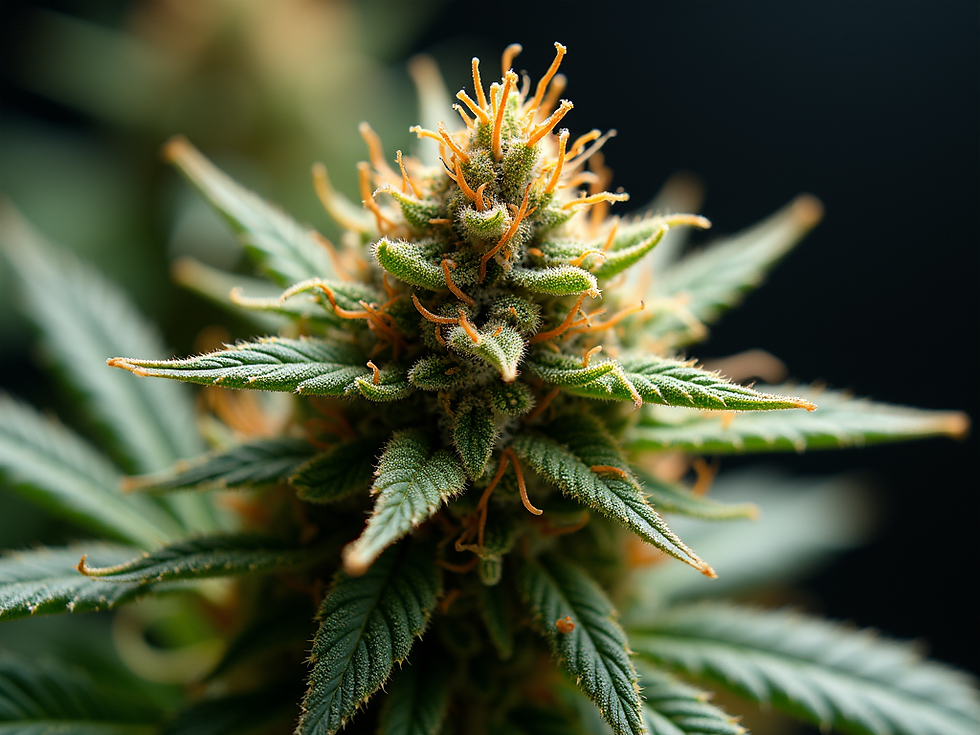Unlocking the Differences Between THCA and THC
- Smoke Central Hemp

- Sep 26, 2025
- 4 min read
Cannabis contains a variety of compounds known as cannabinoids, each with unique properties and effects. Among these, THCA and THC are two of the most discussed, yet they are often confused. Understanding the differences between these two cannabinoids is essential for anyone interested in cannabis, whether for medicinal or recreational use. This article will explore the distinctions between THCA and THC, their effects, and how they interact with the body.
Understanding THCA Versus Cannabinoids
Cannabinoids are chemical compounds found in cannabis plants. They interact with the body's endocannabinoid system, influencing various physiological processes. THCA (tetrahydrocannabinolic acid) is the precursor to THC (tetrahydrocannabinol), the compound responsible for the psychoactive effects commonly associated with cannabis.
THCA is found in raw cannabis and does not produce a high. When cannabis is heated through smoking, vaping, or cooking, THCA undergoes decarboxylation, converting into THC. This process activates the psychoactive properties of the compound.
Key points about THCA and THC:
THCA is non-psychoactive and found in raw cannabis.
THC is psychoactive and produced when THCA is heated.
Both interact with cannabinoid receptors but produce different effects.
THCA may have potential therapeutic benefits without intoxication.

Close-up view of cannabis leaves showing trichomes where cannabinoids are concentrated
How THCA and THC Affect the Body Differently
The primary difference between THCA and THC lies in their interaction with the body's endocannabinoid system. THC binds directly to CB1 receptors in the brain, producing the characteristic "high" associated with cannabis use. This can include altered perception, euphoria, and relaxation.
THCA, on the other hand, does not bind effectively to CB1 receptors. Instead, it may interact with other receptors or pathways, potentially offering anti-inflammatory, neuroprotective, and antiemetic effects without causing intoxication.
Practical examples of effects:
THC: Used recreationally for its psychoactive effects; medically for pain relief, appetite stimulation, and mood enhancement.
THCA: Explored for reducing inflammation, nausea, and muscle spasms without the high.
This distinction makes THCA an attractive option for those seeking the medicinal benefits of cannabis without the psychoactive side effects.

Eye-level view of cannabis buds with visible trichomes containing cannabinoids
Is THCA the Same as THC High?
One of the most common questions is whether THCA produces the same high as THC. The simple answer is no. THCA itself is non-psychoactive and will not cause intoxication. The high experienced from cannabis comes from THC, which is formed when THCA is heated.
For example, consuming raw cannabis or juicing fresh leaves rich in THCA will not produce a high. However, smoking or vaping cannabis converts THCA into THC, resulting in psychoactive effects.
Why does this matter?
For medical users: THCA offers therapeutic benefits without impairment.
For recreational users: Understanding this helps in choosing the right product and consumption method.
For researchers: Differentiating these compounds aids in developing targeted treatments.
If you want to experience the benefits of THCA without the high, consider products like tinctures or capsules made from raw cannabis extracts.

High angle view of cannabis tincture bottle containing THCA-rich extract
How to Use THCA and THC Safely and Effectively
Knowing the differences between THCA and THC can help you make informed decisions about cannabis use. Here are some practical tips:
Choose the right product: Look for lab-tested products that specify THCA and THC content.
Understand consumption methods: Raw cannabis or cold-pressed extracts preserve THCA, while heating activates THC.
Start low and go slow: Especially with THC, begin with a low dose to gauge your tolerance.
Consult professionals: If using cannabis for medical reasons, seek advice from healthcare providers knowledgeable about cannabinoids.
Store properly: Keep cannabis products in cool, dark places to preserve cannabinoid integrity.
By following these guidelines, you can maximize benefits while minimizing unwanted effects.
Exploring the Science Behind THCA and THC
Scientific research continues to uncover the unique properties of THCA and THC. Studies suggest that THCA may have anti-inflammatory, neuroprotective, and anti-proliferative effects, making it a promising candidate for treating conditions like arthritis, epilepsy, and certain cancers.
THC's psychoactive effects have been well-documented, but it also shows potential in pain management, appetite stimulation, and mood disorders.
Understanding the biochemical pathways and receptor interactions of these cannabinoids helps in developing targeted therapies and improving patient outcomes.
For a detailed comparison and more information, check out this resource on thca vs thc.
Final Thoughts on THCA Versus Cannabinoids
The distinction between THCA and THC is crucial for anyone interested in cannabis. While they share a chemical relationship, their effects and uses differ significantly. THCA offers a non-psychoactive option with potential health benefits, while THC provides the classic cannabis high along with therapeutic effects.
By understanding these differences, you can better navigate the world of cannabis products and choose what best suits your needs. Whether you seek relief without intoxication or the full psychoactive experience, knowing the science behind these cannabinoids empowers you to make informed choices.



